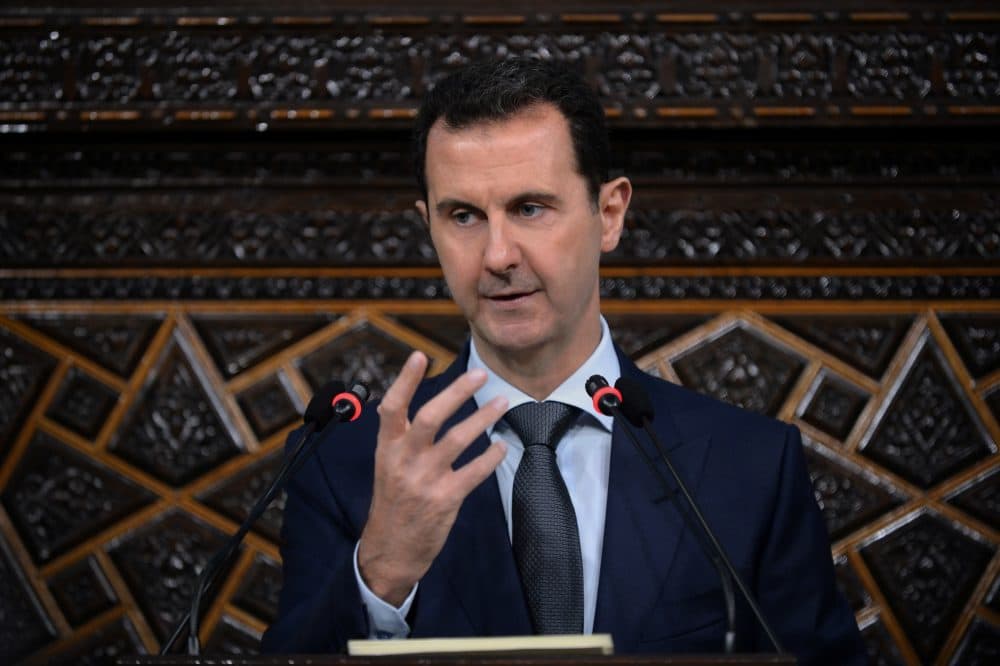Advertisement
Instead Of Bombing Syria, The U.S. Should Deploy Vladimir Putin

Once again, powerful voices in the U.S. government are advising the president to use missiles to force a brutal dictator to the negotiating table. Dozens of State Department officials, fed up with the Syrian military repeatedly violating ceasefire agreements, said in a dissent memo that they would like to target President Bashar al Assad’s regime.
Secretary of State John Kerry has been frustrated that President Barack Obama has not allowed him to threaten President Assad with the use of force. That lack of leverage, many State Department officials believe, has resulted in failed efforts to get Assad to stop fighting. While many members of the Syrian opposition silence their weapons, Assad’s forces keep taking and retaking ground with impunity.
Syria now and Bosnia 21 years ago are very different. There were no Russian military bases in Bosnia.
So, the State Department thought, it might be useful to mimic what former Secretary of State Richard Holbrooke did in Bosnia, when he threatened to bomb and then did bomb Serbia’s President Slobodan Milosevic to the negotiating table with NATO airstrikes. After all, it did end the war.
Syria now and Bosnia 21 years ago are very different. There were no Russian military bases in Bosnia. Russia has a naval base and an air base in Syria and is working hand in glove with Assad’s military. It is not in the interest of the U.S. to get into a fight with the Russians, who have been baiting us by buzzing our Navy ships and helping Assad hold and take back territory.
Russia has more physical interests in Syria than the U.S. does, and President Vladimir Putin has a history of taking dramatic action when he perceives that his military bases are threatened. In 2014, during the Ukraine revolution, Russia annexed Crimea, Ukraine, to protects its access to the Sevastopol naval base, another small base not unlike the Tartus naval base in Latakia, Syria.
Assad has murdered his people with everything from barrel bombs to chemical weapons, and he must be stopped. But sending missiles in to blow up his government is not the right way. We don’t want to break Syria, even accidentally, because, in former Secretary of State Colin Powell’s famous words, "You break it, you own it.” We broke Iraq; it isn’t fixed yet. We helped break Libya; it now has three governments, several militias and Islamic State competing for power. We succeeded in ending the war in Bosnia; the government we helped create is largely dysfunctional. We are better at breaking things than fixing them, so let’s not break them in the first place.
Instead, let’s ask ourselves: Who could be very persuasive in ending the war in Syria? Who would like the West to give him more respect? Vladimir Putin.
What really angers many of our rivals, as well as our allies, is when the U.S. actively engages in or encourages regime change. Putin is standing by Assad in the way that the U.S. did not stand by Egypt’s Hosni Mubarak. When Putin annexed Crimea, he was mirroring what he called the illegal actions of Ukraine’s opposition leaders, who reached an agreement with the president and then ousted him. Putin had an agreement with Ukraine about using the Sebastopol base, and then broke the agreement and annexed all of Crimea. He has shown that he will retaliate against regime change.
Obama has turned the diplomatic dead ends of Iran and Cuba into cul-de-sacs. It’s time to do the same with Syria.
He has also demonstrated a willingness to meet U.S. goals, at least partially. He has targeted Islamic state, a mutual enemy in Syria. Through his diplomats, has called for the immediate reconvening of peace talks.
Granted, Putin’s goal of such talks involves bringing the opposition into a unity government with Assad, which is not what the opposition wants. However, perhaps Putin could be persuaded to soften his position in exchange for a reduction in the economic sanctions that the U.S. and the European Union imposed on Russia after it annexed Crimea.
President Obama has said he’s not into regime change, and he tires of Washington’s one-size-fits-all bombing solution. Obama has turned the diplomatic dead ends of Iran and Cuba into cul-de-sacs. It’s time to do the same with Syria. If we really want to stop the suffering in that country, we need to work through Putin, who really can’t afford to continue his expensive military intervention in Syria when his own country is hurting and in recession due in part to economic sanctions we imposed.
